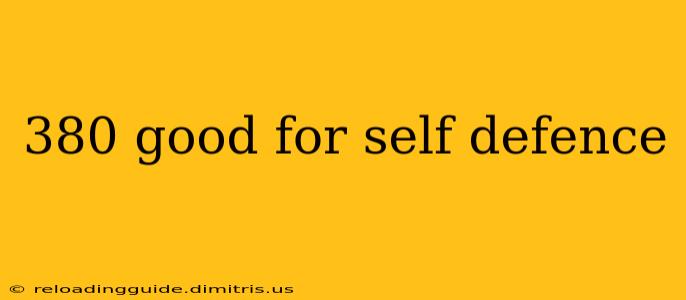The question of whether a .380 ACP (Automatic Colt Pistol) is suitable for self-defense is a common one among firearm enthusiasts and newcomers alike. There's no simple yes or no answer; the effectiveness of any caliber depends on various factors, including shot placement, the individual's training, and the specific circumstances of the self-defense situation. This article will delve into the pros and cons of the .380 ACP for self-defense, providing you with the information needed to make an informed decision.
Understanding the .380 ACP: Ballistics and Performance
The .380 ACP is a relatively small-caliber handgun round, generally considered a low-recoil option. This makes it popular among those new to firearms or individuals with smaller hands. However, its smaller size translates to less stopping power compared to larger calibers like 9mm or .45 ACP. Key characteristics include:
- Low Recoil: Easier to control, especially for less experienced shooters, allowing for faster follow-up shots.
- Smaller Size and Weight: Leads to increased concealability, making it a popular choice for concealed carry.
- Penetration: While penetration capabilities are less than larger calibers, modern .380 ammunition offers improved penetration compared to older rounds. However, over-penetration is less of a concern than with larger rounds.
- Stopping Power: This is often debated. While it may not have the same one-shot stopping power as larger calibers, accurate shot placement remains crucial regardless of caliber.
Advantages of .380 ACP for Self-Defense
- Concealability: Its compact size allows for easy concealment, particularly in smaller clothing or purses. This is a significant advantage for individuals who need discreet self-defense options.
- Easy to Shoot: The low recoil makes it easier to manage, especially during stressful situations. This ease of handling can improve accuracy under pressure.
- Reduced Risk of Overpenetration: Compared to larger calibers, the .380 ACP has a lower risk of over-penetration, meaning the round is less likely to travel through a target and potentially harm innocent bystanders. This is an important consideration in populated areas.
- Availability and Affordability: .380 ACP ammunition is widely available and relatively affordable compared to some other calibers.
Disadvantages of .380 ACP for Self-Defense
- Stopping Power: The lower energy transfer compared to larger calibers means it may require multiple shots to stop a threat. This is why precise shot placement is critical.
- Penetration Limitations: While improved, penetration capabilities are still less than larger calibers. This could be a disadvantage if you encounter a threat wearing heavier clothing or a protective vest.
- Limited Range Effectiveness: The smaller caliber and lower velocity mean the .380 ACP is less effective at longer ranges.
Factors to Consider Beyond Caliber
Choosing a self-defense firearm is a deeply personal decision that extends far beyond the caliber. Consider these factors:
- Your Training: Regardless of caliber, proper training and practice are paramount. Consistent training will significantly improve your ability to handle any firearm effectively in a self-defense situation.
- Your Physical Capabilities: Hand size and strength should influence your choice of firearm.
- Your Lifestyle and Carry Method: Consider your daily activities and how easily you can conceal and carry the firearm.
Conclusion: .380 ACP – A Viable Option, But Not a Guaranteed Solution
The .380 ACP can be a viable self-defense option, particularly for those prioritizing concealability and ease of use. However, it's crucial to understand its limitations regarding stopping power and penetration. Accurate shot placement remains the most important factor in any self-defense scenario, regardless of the caliber used. Thorough training and a comprehensive understanding of firearm safety and laws in your jurisdiction are essential before carrying any firearm for self-defense. This information is for educational purposes only and should not be interpreted as legal or professional advice. Always consult with a qualified firearms instructor and legal professional before making any decisions about firearm ownership or self-defense.

